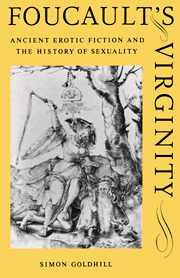2 - THE GAY SCIENCE
Published online by Cambridge University Press: 26 January 2010
Summary
Stand still, and I will read to thee
A lecture, Love, in loves philosophy.
John DonneThoreau, the great American essayist and countryman, begins an essay on walking with the brusque announcement, ‘I want to speak a word for nature.’ This chapter will examine a particular area of ancient erotic writing, the desire of men for other males, and in part certain less brusque affiliations to nature that run through the texts I will be considering. I have called this chapter ‘the gay science’, however, because I shall also be concerned with what might be called a philosophy of erotics, or rather the place of philosophy in erotics and erotics in philosophy. In the previous chapter, I looked at how the central philosophical concern with sophrosune and its expression in the ideals and idea of virginity was explored in the novel and other Greek erotikoi logoi. In this chapter, I shall be discussing how male desire for males brings the concept of philosophy and philosophical argument itself into the sphere of erotic writing. Indeed, not merely philosophy, but also art history, natural history, science, rhetoric, psychology – a full range of ancient intellectual disciplines – will be mobilized as I attempt to trace how the expression of male desire for males is not delimited to a narrow band of homiletic or erotic texts but disseminated throughout the discourse of the ancient novel and related genres. Seeing how male desire is articulated will involve a detour-filled journey round the formulation of the desiring male subject in the texts of his culture.
- Type
- Chapter
- Information
- Foucault's VirginityAncient Erotic Fiction and the History of Sexuality, pp. 46 - 111Publisher: Cambridge University PressPrint publication year: 1995

